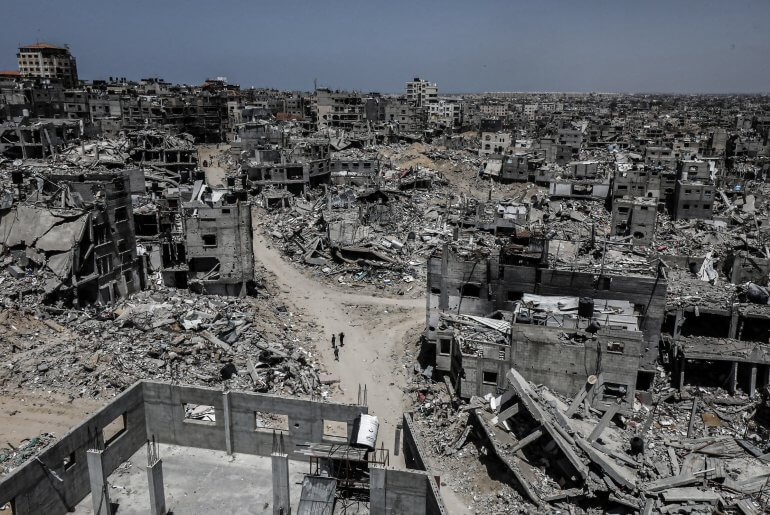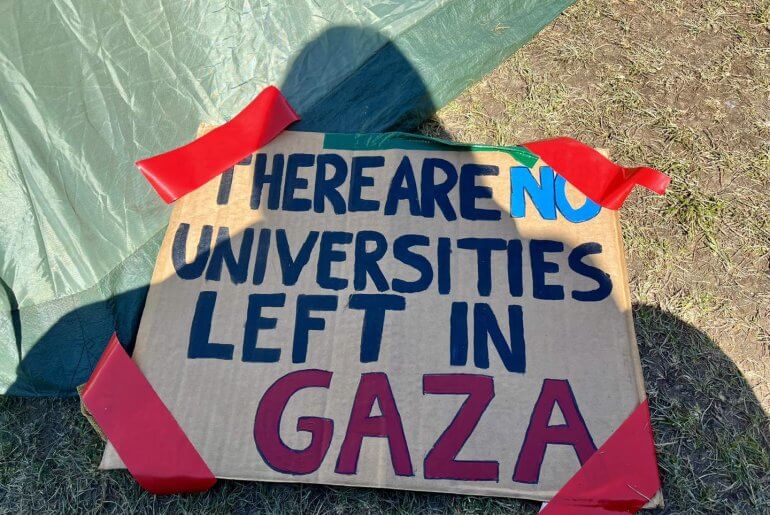Last month, Haaretz revealed that a Palestinian man from Gaza has been stuck at Dubai Airport for five months. Thanks in part to Covid-19, the Gaza-Egypt border has been closed since March, preventing Alaa Alghamry, 26, from returning home to Gaza through Egypt, the only available route. What’s interesting about the story is the assumption that Alghamry’s case is exceptional and the Gaza border closure is out of the ordinary. Alghamry represents a typical and never-ending Palestinian story, especially for the people of the Gaza Strip.
A daily aspect of Palestinian life that receives very little international media attention, travel restrictions are among the most incapacitating consequences of Israel’s military occupation. The restrictions are so extreme that the very idea of travelling has become a type of phobia for many.
‘Rational’ phobia
Phobia in the psychoanalytical discourse is an irrational fear disproportionate to the causative stimulus and can lead to an incapacitating avoidance. Travel phobia (hodophobia) is a less known phobia that entails an irrational fear of travel. Under normal circumstances, those who fear travel assume that travel is dangerous or at least expected to result in regrettable consequences. In the Palestinian context — especially in Gaza — the phobia is firmly based on accumulative real-life experiences. It has grown into a psycho-cultural dynamic whose role is to explain and justify an abnormal situation.
The Gaza Strip doesn’t have an airport or seaport. It has six official crossings. The first is Eretz crossing with Israel and is dedicated to the now-few individuals working in Israel and those issued special permits to visit Israeli hospitals or cross to the West Bank or Jordan. It is also one of Israel’s blackmail points: collaborate with us, or we’ll deny you access. Four other Israel-controlled crossings in the South and East are Gaza’s commercial bloodlines. They are often used as Israel’s method of pressure and collective punishment.
The final and most used of all is the Rafah Crossing with Egypt. It is Gaza’s only official route to the outside world, and is where much of Gazans’ travel phobia has become an established psychological phenomenon. Surely, passing through Eretz induces anxiety as well, as do the tens of IDF checkpoints all over the West Bank. There is always the risk of arrest and humiliation. The Rafah Crossing is phobia-inducing for a lot more, although slightly different reasons. Today, I will take you on a journey that thousands of Palestinians, myself included, have gone through. It’s a journey whose distance is much smaller than its effort, one that has formed much of the Palestinian travel phobia.
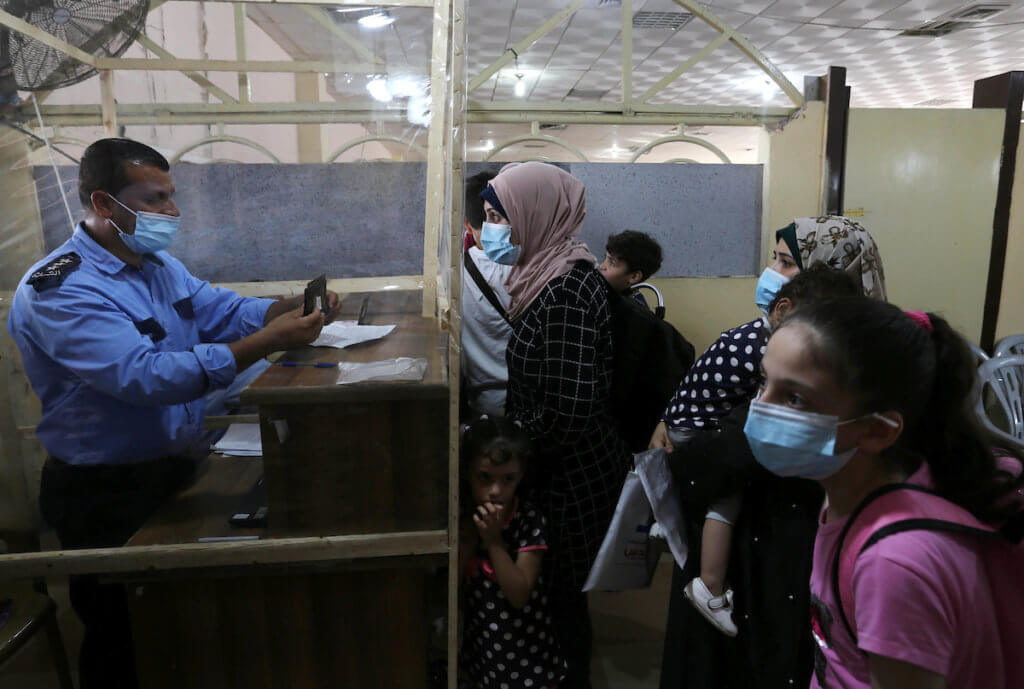
The Rafah crossing
The fact that the Rafah Crossing is a Palestinian-Egyptian crossing doesn’t mean it’s outside Israel’s control. After Israel’s disengagement from Gaza in 2005, the border, after a long period of absolute closure, was handed over to Egypt and the PA, provided that Israel maintains a veto on the entrance and exit of certain individuals. Whenever it open, which is rare these days, the crossing operates based on the 2005 agreed mechanism.
In theory, Palestinians who wish to visit Egypt or use Cairo Airport to travel to the outside world don’t require a visa. Great, you say? Not at all, most Palestinians require a ‘special security permit’ to pass through. It means you hand over your details to the Egyptian side, through the PA, and wait for your turn to travel. Your name could come up the next week or six months later, especially if you’re not in the so-called critical category such as health travellers and students.
Let’s skip ahead and assume that the crossing is opened now, and for some reason you’re given the permission to travel. You’re the lucky one among thousands on the waiting list. Your luck can also be made if you have money. A few hundred dollars pushed through the Palestinians to the Egyptians, and voila…you’re on top of the list.
On the day of travel, people are gathered into buses like school children on a trip, and these buses after the Palestinian passport check enter the Egyptian side one by one. Occasionally, several buses are left stranded between the Palestinian and the Egyptian side for long hours. I remember that hot summer day in my last visit to Gaza when our stranded bus soon turned into a sauna, and people who struggled to breathe began banging angrily on the windows, until a few officers allowed us to wait outside next to the bus. The waiting time depends on the Egyptians and their computer systems that conveniently break down, or because it’s ‘time for prayer.’ Never mind the tens of people baking outside the bus.
So, we survived the bus inferno and are now at the Egyptian side of the border. Prepare yourself for hours of waiting for your name to be called out. And, please try to grow some thick skin allowing you to ignore the insults and harassment by some in the Egyptian police. Get your money ready; you might need to pay a few individuals to accelerate your passport procedures.

Unless your ‘security permit’ is accepted and you’re granted access into Egypt, you’re set aside for deportation to Cairo Airport. You and many others — particularly men between the age of 16 and 50 — are gathered into a bus that you pay extortionate fees for. Your passports are withheld by the police escort and are given back to you at the Airport after you’ve cleared the initial security checks.
If you’re lucky, it might be only six to eight hours from the moment you entered the border to the moment you went on the deportation bus.
The room at Cairo airport
Before Sinai became a security hot zone in 2017, the trip from Gaza to Cairo through Sinai, though arduous, often took six to seven hours. Nowadays, with the widespread presence of army checkpoints all the way to the Suez Canal, the trip might take up to 24 hours.
Finally arrived at Cairo Airport. What’s next? You’re lucky if your flight is only a few hours away. You’re only going to face questioning before being passed through to the passengers’ lounge. Given that the Gaza border openings are unpredictable, people tend to buy tickets well in advance, just in case. On my last trip, my ticket wasn’t due for another three days when I got the airport. Others’ weren’t due for two weeks to come. In this case, we’re basically thrown in a unclean room with limited facilities until it’s flight time.
This room has become a central piece in the Palestinian travel experience, and the Gazan travel phobia. Save for a filthy bathroom guarded by a cleaner who demands money every time you needed to use it, the room inhabitants are denied access to almost everything. In this stifling room, which you better not visit in Summer, the cycle of abuse and financial blackmail starts again.
Desperate to call your worried loved ones, you’ll need to bargain with the room guard to buy you an Egyptian sim card for a handsome fee. You also pay them to have some food or drinks – at a much higher cost than normal.
In most cases, the room security guards are young men who clearly come from underprivileged Egyptian families. Some of them are just doing a job they never want to do. Some are sympathetic and helpful to the room inhabitants, and are oftentimes given cash for their services. Others see in this brief window of power an opportunity to squeeze as much material assets out of the passengers as they can. For those, it seems, mutual nationalist consciousness and the so-called brotherly Egyptian-Palestinian bonds are of little concern. What motivates them is their financial needs. That room was a fascinating, though unpleasant, micro representation of how poverty and petty power demoralise people.
Oftentimes in that room, we’re not the representatives of what is allegedly one of Egypt’s most upheld causes. Rather, we’re a group of nobodies who are a potential security threat. Among us are students, doctors, engineers, and university professors who have to deal with the abuse of guards in their teens. One of my fellow passengers, probably mid-50s, was a top surgeon in Germany, but he still held only a Palestinian passport, and he ended up bullied and threatened by a brute Egyptian officer. Having failed to counter-argue after the surgeon challenged him, the officer turned to verbal abuse calling Palestinians “traitors, who sold their land to the Jews.” This is basically the Palestinian verbal ‘blood libel’ that some Arabs, due to ignorance or sheer resentment, have used against us since the moment we became refugees in 1948. It’s the same trope that the mouthpieces in the UAE renewed to justify their normalisation with Israel. A classic but incredibly uncreative technique of ‘blaming the victim’ designed to escape guilt and evade responsibility.
Returning to Gaza
Three miserable days have passed, and I finally boarded the airplane and left Egypt. Such a relief! As always, for a Palestinian from Gaza holding a Palestinian passport, Egypt’s borders are almost always a hostile territory. In contrast to Egypt on the inside, which is warm and welcoming.
But what about many of those coming back to Gaza through Cairo Airport? The same room… the same filth… the same abuse.
And, if the Rafah Crossing happens to be closed, which is the case often, you’re likely to suffer significantly more. Unless you hold a security permit or at least know someone in Egypt who knows someone in the government, the Egyptian authorities won’t let you in. You better be prepared to empty your bags and make the room your makeshift home until the border has reopened. Last time I was there, the Egyptians would exempt those over 50 from the security permit, the same applies if you were a female. Older people and women didn’t represent a security issue – genius thinking!! They learned the technique from the Israelis, who, when they existed in Rafah, sometimes would stop anybody between the ages 16 and 35 from travelling. Bear in mind, if you were a woman with your a husband under the age of 50, then you’re stuck with him.
While I experienced only a three-day entrapment in that room, a friend of mine – let’s call him M.N. – who a few years ago happened to arrive at Cairo while the Rafah border was closed ended up stranded for sixty-three days. Most of that period was spent in that deportation room. As more passengers arrived, the room became overcrowded and the Egyptian authorities had no choice but to move most of them to the Egyptian side of the border with Gaza. Imagine that some can tantalisingly see their neighbourhood from across the fence, but couldn’t be home. As always, the pretext is security concerns and Israeli coordination.
Nowadays, as Egypt is fighting a war against terrorism in Sinai, the journey to Gaza has gotten worse. Enough to know that because of alleged fears of Daesh’s attacks, Palestinians are no longer allowed to use the ‘Mubarak Peace Bridge’ to cross the Suez Canal to and from Sinai. Instead, they have to wait for long hours for the ‘Al-Faradan’ ferry to carry them across the Suez Canal. The ferry works limited hours and has a limited capacity. Those who arrive at the Suez Canal by late morning will have to spend the night there in order to catch the next-day ferry — if they’re ahead in the queue. As you wait, you’re not even allowed to step outside your taxi.
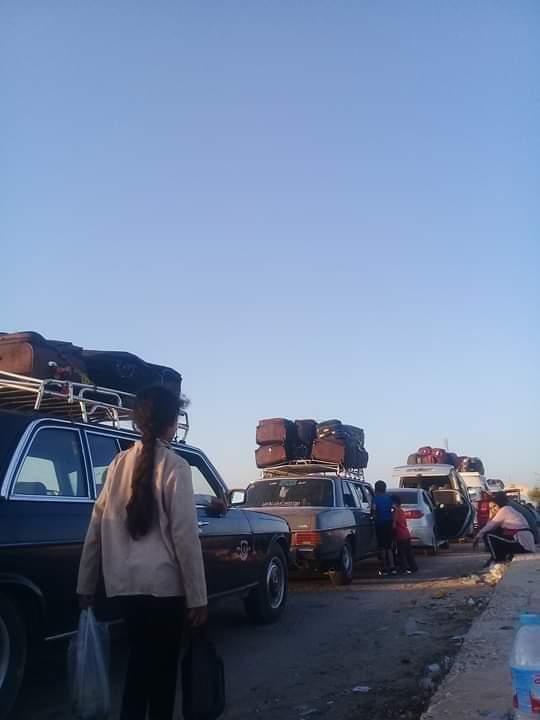
In a report to Arab21 titled “the Route of Torture from Cairo to Gaza,” travellers spoke bitterly about being stuck for three days or more on the Western side of the Suez Canal waiting for their turn to board the Al-Faradan ferry. Others said the situation was so dire that some of the locals offered the passengers food and drinks. After the ferry, passengers — like the locals of Sinai — have to go through dozens of Egyptian army’s checkpoints all the way to the Gaza border.

Because Sinai goes under curfew in the evening, the traditional 5-hour trip from the Suez Canal right to the Gaza border is no longer an option. Having crossed into Sinai, the passengers are now dropped off at the Egyptian town of Al-Arish, nearly 30 miles from Gaza border, to spend the night. They head for the border the next morning. The roughly 250-mile trip from Cairo to Gaza now takes no less than 48 hours.
But, why the mistreatment?
The Egyptian government’s mistreatment of Palestinian travellers from Gaza may not after all be different from the mistreatment of the 400,000 Egyptian residents of North Sinai. Because of the critical security situation, they too have to deal with tight measures and restrictions. There’s also the infamous Egyptian bureaucracy, as well as the individuals and companies who may benefit from the Gaza blockade.
These factors are only marginal in the overall experience of Palestinian travellers. Security measures, of all, don’t fully explain the mounting restrictions on Palestinians’ freedom of movement, much less what seems like systematic and bureaucratic abuse. Some might say it’s because Egypt is not particularly amicable with Hamas, an offshoot of the Egyptian regime’s arch enemy, the Muslim Brotherhood. But this argument falls short because the harsh measures, although intensified since Egypt’s war on terror, existed long before Hamas’ take-over of the Strip in 2007 or Sisi’s presidency commencing in 2013.
To most Palestinians, the argument goes full circle to the original violator, Israel. Even though the Jewish State doesn’t physically exist on the Gaza-Egypt border, it still has a lot of leverage in its running. Israel remains the occupation force fully in control of Gaza’s borders, air, and territorial waters. The border with Egypt is an exception only in terms of visible operation, not in actual control.
The restrictions must be seen as a form of pressure on Palestinians to accept the status quo and give up resistance in return of a semblance of normal living – as if we ever experienced anything of the kind since 1948. Sufficient to know that Rafah-Crossing increased difficulties seem to have coincided with President Trump’s declaration of the Deal of the Century early this year. In the end, it’s about who benefits the most from Palestinian misery. You probably know the answer.
In the end…
It boils down to this: if you’re a Palestinian from Gaza, especially if you’re young, travelling is a dream, a very difficult dream. If it happens at all it’s a source of deep anxiety. Not only (or, because) the travel experience is extremely unpleasant, but because it comes with a lot of uncertainty. What’s at stake is a lot. For many parents, the prospect of their children leaving Gaza entails the possibility of not seeing them again. Allowing their children to travel, if they are ever able to, must be considered an act of ultimate sacrifice. The only consolation is that leaving Gaza might make the child happier or in a better position. This is a bargain many are willing to make to escape the almost unbearable living conditions inside the Strip.
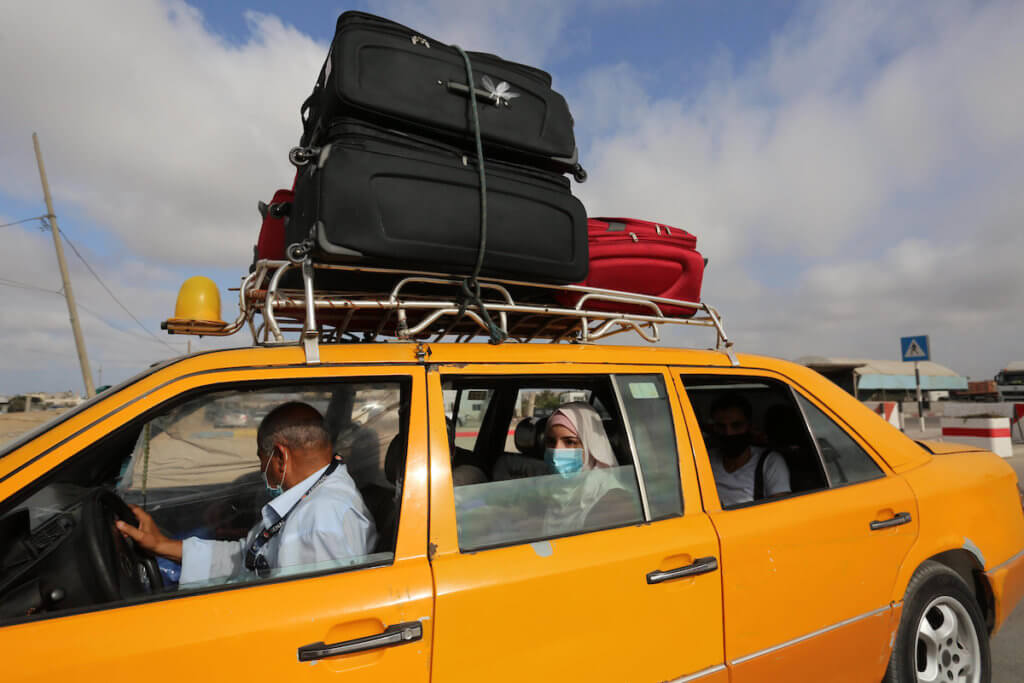
This situation serves Israel well. The notion of young people, especially the educated, taking risks to leave Gaza reduces their chances or willingness to ever come back. For Israel, it reduces the Palestinian population, a so-called demographic threat, and eases the local resistance to Israel’s policies.
For many of us, it’s not a black-or-white situation. Acquiring a better life doesn’t necessarily mean leaving Palestine behind. Au contraire, from personal experience and the experience of almost every Palestinian I know abroad, being outside Palestine provides different tools of resistance and broader margin for manoeuvrability. Many of those who left Gaza ended up becoming dedicated defenders of the cause from abroad: in advocacy, academia, and media. A friend of mine jokingly said that we’ve become the Jews of the Arab World, and fighting for Palestine from abroad has become similar in technique and goals to early Zionism. ‘A Palestinian Zionism,’ he would cynically remark. I’ve seen the same sentiment among diaspora Palestinians and their descendants who never set foot in Palestine.
In the end, Palestinian travel phobia is a condition manufactured by other human beings. While other traditional phobias can be treated with cognitive behavioural therapy, only true and fair political therapy can heal it.
Emad Mousa
Emad Moussa is a Palestinian-British academic, whose focus is the social psychology of mainly the Israeli-Palestinian conflict.

